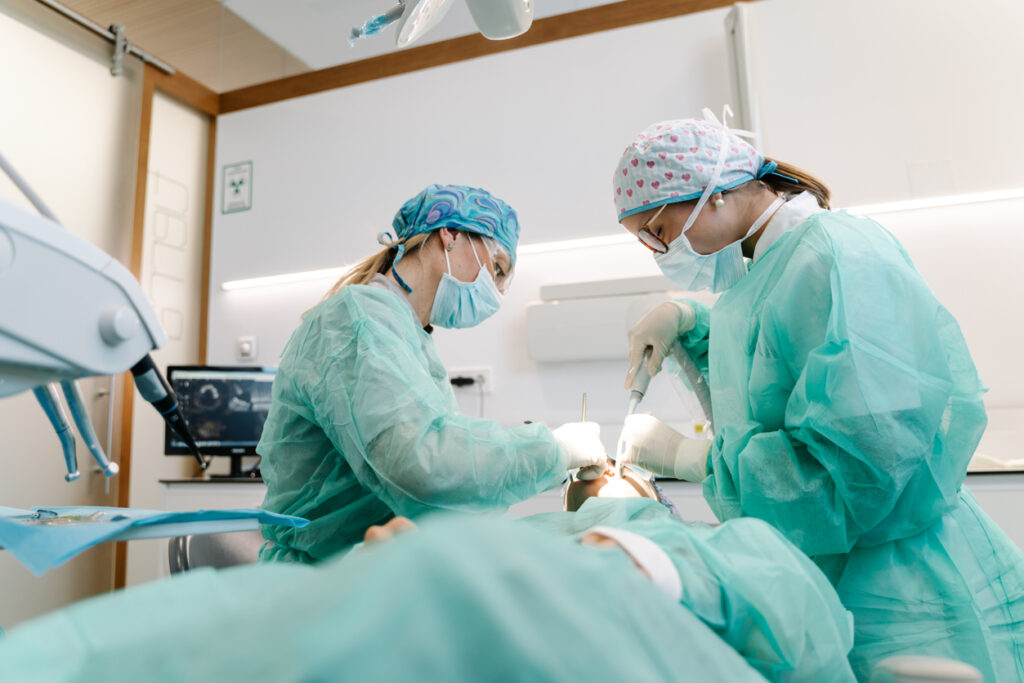What to Expect When You Need a Bone Graft

Patients who experience the effects of severe gum disease may require oral surgery in Littleton to prevent further damage to their oral health. The McGinty Dental Group provides dental bone graft surgery for patients with bone loss in the jawbone. While this procedure is often performed prior to the placement of a dental implant, Dr. McGinty may also recommend it when bone loss begins to negatively impact the health of your teeth and to lower your risk of permanent tooth loss.
Let’s look at what you can expect if you require oral surgery in Littleton and need a bone graft.
What is a Bone Graft?
Gum disease and tooth loss begin a process where harmful oral bacteria cause your jawbone to deteriorate. As the condition progresses, the underlying foundation of your oral health weakens, making further tooth loss possible.
A dental bone graft works to add volume and density to your jaw in areas where bone loss has developed. The bone graft material used by Dr. McGinty in the procedure may be taken from your own body or procured from an outside clinic.
How is the Procedure Performed?
Dr. McGinty will create a small incision along your gum line during your oral surgery in Littleton. She will then clean out the infected area to ensure that no further bone loss occurs. Next, the bone grafting material is added to repair the damaged area of your jaw. Once everything is in position, the incision is closed and the body begins the healing process.
How Does a Bone Graft Work?
The body needs assistance to heal the damage caused by gum disease and tooth loss. A bone graft provides additional support the body uses to regrow bone tissue and regenerate and repair the damaged area of the jawbone. Think of it as the bone graft acting like the foundation on which your body rebuilds.
What Happens During Recovery?
During the week following your oral surgery in Littleton, you will experience some discomfort, swelling, and facial bruising. This is all perfectly normal, and the effects of your surgery will diminish after a few days. Dr. McGinty will provide advice on how to reduce swelling and manage any discomfort you may experience.
Most patients report experiencing very little pain following their surgery. It’s important to follow all post-surgery instructions provided by Dr. McGinty to prevent any complications from developing.
What Complications Should Cause Concern?
Bone grafts have a very high success rate. However, patients who smoke or have certain underlying health conditions have a higher risk of failure. If you experience any of the following symptoms, you need to contact Dr. McGinty immediately:
- Pus that drains from the surgical site.
- Gum tissue that pulls away from the base of your teeth.
- Increased swelling or pain after the first week.
How Long Does Recovery Last?
While the symptoms of your oral surgery will fully subside after one or two weeks, your bone graft can take anywhere from three to nine months to fully heal. The length of your recovery time will vary depending on the type of bone graft you received and the area in which the graft was placed. Patients heal at different rates, so it’s important to schedule regular follow-up visits with Dr. McGinty so she can follow the healing process.
Who Needs a Bone Graft?
Any patient who has experienced a loss of bone in their jaw typically needs a bone graft to repair the foundation of their oral health. Dr. McGinty may recommend the procedure to patients who:
- Need dental implants to replace one or more missing teeth.
- Need to strengthen their jawbones to support wearing dentures.
- Need to have a tooth extracted due to gum disease or bone deterioration.
- Have developed bone loss as a result of periodontitis.
If you need oral surgery in Littleton, Dr. McGinty will provide the compassionate care you need to look and feel your best. Contact our office today to schedule your oral surgery consultation.
